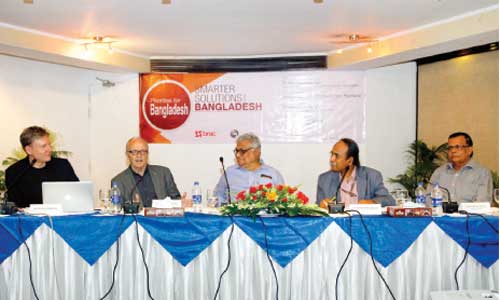E-procurement, spending on health care could save huge money: study
Spending 1 per cent of the country’s national budget on smarter policies like e-procurement, digitalisation of land records and healthcare could make Bangladesh Tk 3.7 trillion better off, according to a study.
The study, Smarter Solutions for Bangladesh, was conducted by Copenhagen Consensus Center in cooperation with Brac’s research and evaluation division.
‘Over five years, spending just 1 per cent of the Bangladeshi budget on smarter policies could make Bangladesh Tk 3.7 trillion better off and development agencies could achieve US$ 4 billion more, if just I per cent of their spending was better allocated,’ said Copenhagen Consensus Centre director Dr. Bjorn Lomborg while launching the study at BRAC Centre in the city on Thursday.
The study showed that the government spends Tk 72,000 crore for annual procurement while an e-procurement system could help the government to save Tk 5.274 crore a year.
The study also pointed out 72 priority sectors, among initial 1,000, for implementing smart policies including making Dhaka more liveable, enhancing higher secondary education opportunities for girls, nutrition for pregnant women, and vaccination of the slum children.
Investing on child health would allow the government to create skilled manpower for the future and the government cold have saved Tk 600 crore from the manpower sector.
Speaking on the occasion, Nobel laureate economist Finn KydIand said Bangladesh is the first country in the world which cooperated with Copenhagen Consensus Center to conduct this research.
‘You are pioneer in this regard and I am excited to see Bangladesh leading the world in using this approach for national priority-setting. It is a framework that can only improve policy outcomes,’ he said.
He also said that a prioritised list of investments would produce phenomenal benefits for Bangladesh.
Economic Advisor to prime minister Mashiur Rahman said sustainable development can never be acquired without investment on human assets.
‘Without investment on human assets sustainable development can never be acquired, we need to invest more on human assets than physical assets,’ he said while speaking at the dissemination programme.
The study project engaged with countless Bangladeshis, putting more than 1,100 pages of peer-reviewed and Bangladesh-focused researches into the public domain.
Brac executive director Muhammad Musa said that Bangladesh Priorities began with a thorough review of 26 background studies prepared for the 7th Five Year Plan (2015-16 to 2019-20) created by the General Economics Division (GED) of the Planning Commission.
News COurtesy: www.newagebd.net











